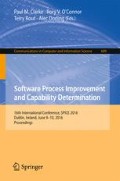Abstract
Research has shown that adopting and implementing Software Process Improvement (SPI) reference frameworks can produce benefits in software product quality and delivery. However, limited attention has been given to sustaining SPI over time and the influence of the organizational context on SPI activities. The authors have previously proposed a theoretical SPI Sustainment Model derived from the literature to address this gap. This paper extends that work by empirically validating the model using longitudinal case studies of companies that have adopted CMMI. The validation supports the underlying theory of the model that SPI program benefits can be reinforced and sustained by nurturing influential factors, identified in the model, in the organizational context in which the SPI activities take place. The paper concludes that viewing SPI more broadly as an organizational investment rather than just an incremental product or process improvement tool may support sustained benefits.
Access this chapter
Tax calculation will be finalised at checkout
Purchases are for personal use only
References
Gupta, J.N., Sharma, S.K., Hsu, J.: An overview of knowledge management. In: Jennex, M. (ed.) Knowledge Management: Concepts, Methodologies, Tools, and Applications. Information Science Reference, Hershey, PA (2008)
Turban, E., Aronson, J.E., Liang, T.-P.: Knowledge management. In: Decision Support Systems and Intelligent Systems, Prentice Hall, Upper Saddle River, NJ (2005)
Potter, N., Sakry, M.: Developing a plan. In: Making Process Improvement Work, pp. 1–19. Addison-Wesley, Reading, MA (2006)
Morgan, P.: Process improvement: Is it a lottery? methods & tools, practical knowledge for the software developer. Tester Proj. Manag. 15(1), 3–12 (2007)
Calvo-Manzano, J.A., Cuevas, G., Gómez, G., Mejia, J., Muñoz, M., Feliu, T.S.: Methodology for process improvement through basic components and focusing on the resistance to change. J. Softw. Evol. Process. 24(5), 511–523 (2012)
Conradi, H., Fuggetta, A.: Improving software process improvement. IEEE Softw. 19(4), 92–99 (2002)
Khurshid, N., Bannerman, P.L.: Modeling SPI sustainment in software-developing organizations: a research framework. In: Mitasiunas, A., Rout, T., O’Connor, R.V., Dorling, A. (eds.) SPICE 2014. CCIS, vol. 477, pp. 214–225. Springer, Heidelberg (2014)
Ogasawara, H., Takumi, K., Minoru, A.: Proposal and practice of software process improvement framework – toshiba’s software process improvement history since 2000. J. Softw. Evol. Process. 26(5), 521–529 (2014)
Clarke, P., O’Connor, R.V., Leavy, B., Yilmaz, M.: Exploring the relationship between software process adaptive capability and organisational performance. IEEE Trans. Softw. Eng. 41(12), 1169–1183 (2015)
Standard CMMI Appraisal Method for Process Improvement (SCAMPI), Version 1.1: Method Definition Document (2001)
Yin, R.K.: Case Study Research: Design and Methods, 5th edn. Sage Publications, Thousand Oaks, CA (2014)
Bryman, A.: Social Research Methods, 4th edn. Oxford University Press, New York, NY (2012)
Corbin, J., Strauss, A.: Grounded Theory Research: Procedures, Canons, and Evaluative Criteria. Qual. Sociol. 13(1), 3–21 (1990)
Acknowledgements
This research was partly supported by NICTA, funded by the Australian Government through the Department of Communications and the Australian Research Council through the ICT Centre of Excellence Program.
Author information
Authors and Affiliations
Corresponding author
Editor information
Editors and Affiliations
Rights and permissions
Copyright information
© 2016 Springer International Publishing Switzerland
About this paper
Cite this paper
Khurshid, N., Bannerman, P.L. (2016). SPI Sustainment Model Validation: Two Exploratory Case Studies. In: Clarke, P., O'Connor, R., Rout, T., Dorling, A. (eds) Software Process Improvement and Capability Determination. SPICE 2016. Communications in Computer and Information Science, vol 609. Springer, Cham. https://doi.org/10.1007/978-3-319-38980-6_24
Download citation
DOI: https://doi.org/10.1007/978-3-319-38980-6_24
Published:
Publisher Name: Springer, Cham
Print ISBN: 978-3-319-38979-0
Online ISBN: 978-3-319-38980-6
eBook Packages: Computer ScienceComputer Science (R0)

